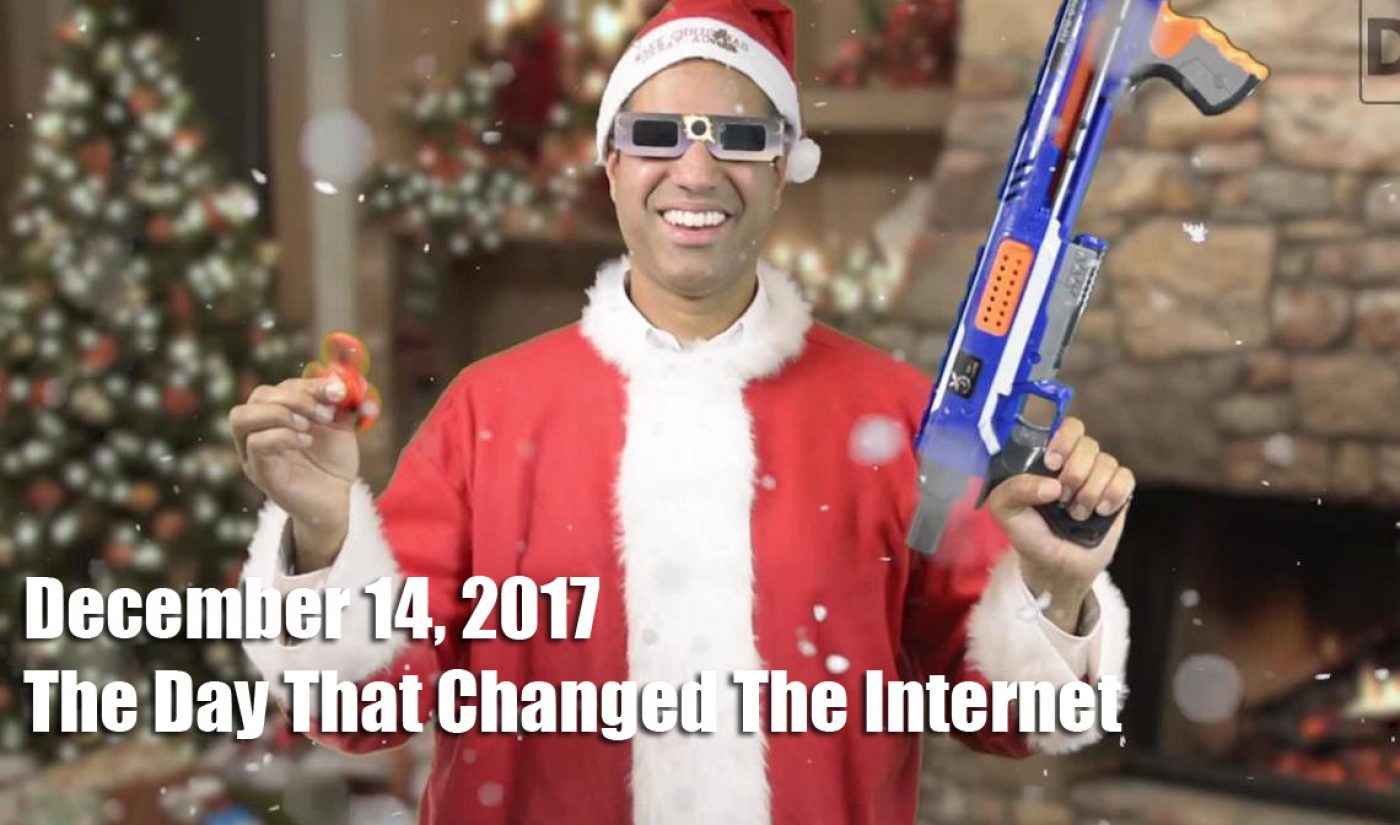Insights is a weekly series featuring entertainment industry veteran David Bloom. It represents an experiment of sorts in digital-age journalism and audience engagement with a focus on the intersection of entertainment and technology, an area that David has written about and thought about and been part of in various career incarnations for much of the past 25 years. David welcomes your thoughts, perspectives, calumnies, and kudos at david@tubefilter.com, or on Twitter @DavidBloom.
If ever there was a week when the digital media landscape took a decisive turn in a new direction, it might be this week. More precisely, it might be this one decisive day, specifically Thursday, December 14, 2017.
The string of announcements, posts, and other news that arrived on Thursday paint a picture of imminent and ground-shifting change, while spotlighting companies with a chance to survive and thrive amid all that change. Let’s just review what happened, what’s coming, and what we get to celebrate (or “celebrate,” depending on your perspective) this holiday season:

Subscribe to get the latest creator news
- First, of course, is that 3-2 FCC decision to repeal net neutrality rules that have kept online access relatively open to all comers. It’s possible that FCC Chairman Ajit Pai is correct when he says reducing regulations will spark investment and competition and lead to more opportunities and better access for everyone. T-Mobile certainly believes that’s the case. This week, T-Mobile bought Layer3, a pay-TV overbuilder, betting the newly configured landscape will give it some new opportunities beyond being the No. 3 wireless provider. It’s also possible that Pai is merely justifying why he gave a handful of large, monopoly-inclined companies free rein to wring as much revenue as they can from customers with few alternatives. And it’s possible that those companies also will start charging media companies trying to reach those customers, which would hammer many smaller and niche creators. In fact, given the new situation, it’s arguably a breach of fiduciary duty if those monopolistic owners of Internet pipes don’t exploit customers and media providers, now that they can. Merry Christmas and a Happy New-Style Internet, everyone!
- Disney is buying most of 21st Century Fox for $52.4 billion. The parts getting bought provide Disney with more movies and shows such as The Simpsons and Family Guy to better compete with Netflix when Disney’s streaming service launches in 2019. Less certain is what happens with fast-rising Hulu, three-fifths of which is now owned by Disney. CEO Bob Iger told analysts, “We’ll see,” when asked what Hulu would look like under a controlling partner instead of its current hydra-headed situation. The deal also reunites the first six Star Wars movies and two beloved Marvel franchises with the company that already owns the rest of LucasArts and Marvel. The resulting content powerhouse surely will dominate traditional Hollywood (and media buying) and can better take on Netflix. The deal almost certainly will put a bunch of people out of work, just in time for the holidays. Also, the Fox remainders (the broadcast network along with the news, business and sports cable channels) probably will merge back into News Corp., so Rupert can recreate synergies between the Wall Street Journal and the President’s Favorite Network. Happy Kwanzaa!
- ESPN-owning Disney isn’t the only company with an interest in sports.. Beginning tonight, (link: http://gleague.nba.com/news/nba-g-league-games-twitch/ ) ) Amazon’s Twitch.TV will live-stream games from the NBA’s understudy, the G League with Twitch commentators doing play-by-play. Soon, NBA2K esports tournaments will be indistinguishable, as an online viewing experience, from a Tuesday night game between the Maine Red Claws and the Sioux Falls Skyforce. ESPN was already carrying some G League games, while Amazon already was streaming 10 NFL Thursday games to its Prime subscribers, all of which suggests even more competition just ahead for video rights to many sports. And that’s a big present under the tree (or whatever they celebrate around) of the NBA’s Adam Silver and the NFL’s Roger Goodell. O Tannenbaum!
- Buzzfeed CEO Jonah Peretti posted a somber manifesto declaring, “The media is in crisis.” Well, yes. Peretti rightly blames Google and Facebook for vacuuming up “the vast majority of ad revenue, while paying content creators far too little for the value they deliver to users.” The predictable result of such penury: a profusion of cheap media, fake news, propaganda, conspiracy theories, sensationalistic rewrites, pirated videos and (my favorite) “shady off-shore content farms.” This coming from a founder of both the Huffington Post and Buzzfeed, both once widely criticized for their shallow and cheap journalism. The sources of success these days, Peretti said, are “multiple revenue streams.” Buzzfeed, it’s true, badly missed revenue targets this year, but the company remains a digital media beast, with $280 million in revenue. Less clear is how many other publishers can move beyond the Duopoly’s bargain-basement revenue shares to make money from subscriptions, live events, licensing, merchandise and whatever else. As Digiday wrote in its (rather self-congratulatory) commentary on Peretti’s post, “Multiple revenue streams is the inevitable end state for any sustainable business model.” Now you tell us. Anyway, Happy New Year for your end state sustainable business models!
- Facebook, meanwhile, sharpened Peretti’s point by announcing an end to payments for about 300 publishers and personalities that create live video for its Newsfeed. As Facebook focuses on its Watch service, all those creators must hope that mid-roll ads (which Facebook execs once denigrated as “interruptive”) will make up the lost revenue. Only small, mid-roll-interrupted presents for you on this Happy Chanukah!
- Business Insider’s parent operation is now just Insider, to free the company to dive into vertical sectors beyond business in a play for, yes, multiple revenue streams. New verticals could be toys or food or travel, but the new naming freedom should simplify both ad sales and reader focus. More focus and nominative flexibility mean a Good Winter Solstice to you!
- The publisher of the New York Times, 66-year-old A.O. Sulzberger, is stepping down in favor of his son, 37-year-old A.G. Sulzberger. It’s an expected and orderly changing of the guard, but brings a young and forward-thinking leader to the Times at a very good time. A.G., a veteran former reporter, was a key part of the bruising 2014 internal review of the Times’ then-sleepy engagement with a fast-changing media landscape. The resulting Innovation Report lit a much-needed fire under the Times’ somnolent ass. The result has been a delight for both readers and investors. If A.G. can continue that smart next-generation embrace of quality, technologically sophisticated journalism, the Times has a promising future. As it is, the company has become a paragon of high-quality journalism that also makes money. The Times has built an admirably large base of subscribers for both its core publication and a raft of niche subscription offerings such as the crossword and cooking. Finally, something to celebrate here in the holidays!
Together, these developments, which basically emerged over a single 24-hour period this week, represent tectonic shifts in the digital-media landscape, overlaid with important moves by several publishers fighting to still matter. I wish each and every one of them a fine holiday season filled with joy, happiness and goodwill toward all.
Except Ajit Pai. Screw that guy.








